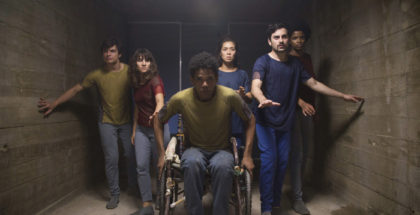Netflix UK TV review: Black Mirror Season 3, Episode 6 (Hated in the Nation – spoilers)
Review Overview
Hate
9Humanity
9Horror
9David Farnor | On 11, Nov 2016
Warning: This contains spoilers. For our spoiler-free review of Black Mirror Season 3, click here.
“I didn’t expect to find myself living in the future, but here I fucking well am,” sighs (Kelly McDonald) in Hated in the Nation, the finale of Black Mirror Season 3. It’s a sentiment that underlies much of Charlie Brooker’s dystopian anthology, a show that excels in exposing age-old human flaws through shiny new technology. How impressed you are by what it unearths depends, perhaps, on how much you already think about the role of technology in your everyday life – with an audience now consisting entirely of Netflix subscribers, the novelty of its revelations, or the insight behind each story’s premise, carries inherently less impact.
Fortunately, though, Season 3 of Black Mirror doesn’t just set out to shock: in the case of San Junipero, it moves you with an unexpected romance, while in Nosedive, it asks you to laugh at the familiar bleakness rather than be surprised. Playtest, on the other hand, is a haunted house designed to make you jump. The technology in each isn’t the end goal of the plot, but the catalyst to tell engaging, funny, scary or sympathetic stories. The hit-and-miss nature of the programme is still in tact (Shut Up and Dance works as a visceral ride, yet lacks more substance than that), but its latest, upgraded incarnation follows more in the footsteps of standout legacy episodes An Entire History of You and Be Right Back. Hated in the Nation ranks alongside them as one of the best episodes to date.
The show’s first feature-length outing, it feels cinematic in its scale and weight, as well as its sublime visuals. Director James Hawes, who has previous on Penny Dreadful, as well as Doctor Who, is a dab hand at blending realistic stories with fantastical elements, slotting neatly into the glossy world-building that has come to define Black Mirror. And so it is that alongside the day-to-day British life he presents, he quietly introduces an unusual thing: a robot bee, which has been designed to replace the essentially extinct bee population and maintain the natural cycle of the country’s flora and fauna.
It’s the kind of detail that makes everything eerily alien, yet also that bit more convincing – not that we need help with the latter, once we witness the all-too-recognisable social media hate storms that repeatedly break out, focusing on whatever despicable figure du jour happens to be in the headlines. They soon prompt the hashtag #DeathTo – a trending topic that seems to be connected to a string of gory deaths across the country, starting with a Katie Hopkins-esque journalist, Jo Powers (played by Humans’ Elizabeth Berrington).
Enter detective Karin Parke (Kelly Macdonald) and young shadow Blue (Fay Marsay), who are assigned to the case. Macdonald, who is entering similar territory to her role years ago in the fantastic mini-series State of Play, is marvellous as the world-weary investigator, at odds with the new-fangled technology around her – the polar opposite to Fay Marsay, whose enthusiasm for the web and gadgets carries a winning charisma that recalls Kate Mara in House of Cards. (The fact that Marsay is unrecognisable from her role as the Waif in Game of Thrones is testament to just how good she is.)
Together, they make for a classic odd couple, snapping at each other through dialogue that drips with the acerbic pen of the series’ creator. This is Black Mirror in Scandi noir mode – and it’s chilling, gripping stuff.
But the answers they uncover are arguably the real star: the Autonomous Drone Insects, as the bee surrogates are called, are being controlled by a hacker who has programmed them to follow the #DeathTo hashtag and attack the top trending name.
“That Internet stuff drifts off like weather,” observes Karin, with telling bitterness. “It’s half-hate, they don’t mean it. The hate in a marriage, that’s in 3D, that’s had work put in.”
Black Mirror has always excelled at expressing the virtual world in human terms, or vice versa. Not unlike Mr. Robot or Halt and Catch Fire, it’s a show that’s fuelled by metaphors, digital and emotional, sitting in a limbo between reality and cyberspace that drags the horror out of one plane and exposes it in the other. With Hated in the Nation, Charlie Brooker has rarely been so elegant or horrifying – like his Dead Set series that drew a parallel between audiences sucked into reality TV and zombies, this movie hits its topic on the head without bludgeoning you in the process.
It’s not unusual for social media conversations to descend into anger, offence or abuse – and, as Karin notes, it’s often only half-intended. But taken to the logical extreme, that weather is a scary cloud to be hold; given physical form, the Twitter hive mind has the force to drill through even the most protected offline bubbles and tear someone to pieces. Hawes and his team of sound designers, in particular, deliver that spectacle with nailbiting dread, as the insects, one by one, crawl through air vents and letterboxes; their clinking of glass and metal and their gentle buzzing is heightened to nerve-jangling effect by Martin Phipps’ score. It’s the best remake of The Birds you’ll ever see.
Once the pieces fall into place, the full unsettling picture begins to emerge: it’s not just the person who hacked the ADIs to blame, but also the government (given gravitas by Benedict Wong’s NCA agent), who were all too happy to compromise security and privacy, if it meant they had more data to monitor. And, of course, there are the people who spread the hate to begin with. The final twist is the episode’s real strength, as it sees the #DeathTo users have their cruelty turned upon themselves in a skin-creeping bit of plotting by our hacker. Over 300,000 people are droned to death. Is it just to have that done to them? As Blue heads off on her own secret personal quest of revenge, what might have been a final note of hope leaves instead a stinging conundrum: does anyone really have the authority to decide who becomes the next victim in this ongoing chain of hate?
Those questions buzz around your head for days after viewing, made all the more pertinent by the way that Black Mirror roots these abstract concepts in such engaging, everyday human experience. It’s online abuse made 3D; it’s had a lot of work put in. Black Mirror’s Season 3 has been, in a way, as uneven as ever, but it builds up to a pay-off that proves the anthology still has the ambition, insight and intelligence to make you think. The novelty might have worn off, but we’re all living in the future. And whether you expect it or not, it’s all too easy to turn a light rain into a downpour.
Black Mirror Seasons 1 to 3 are now available on Netflix UK, as part of an £9.99 monthly subscription.
For spoiler-filled reviews of each new episode of Black Mirror, click here.
Photo: Laurie Sparham/Netflix





















